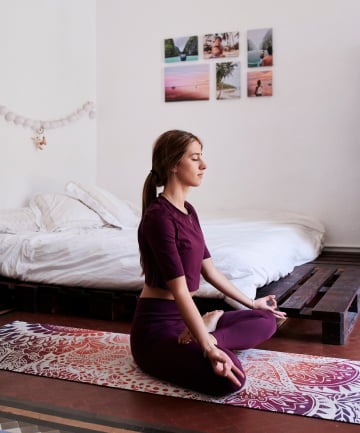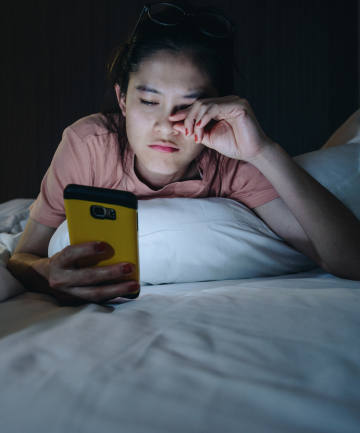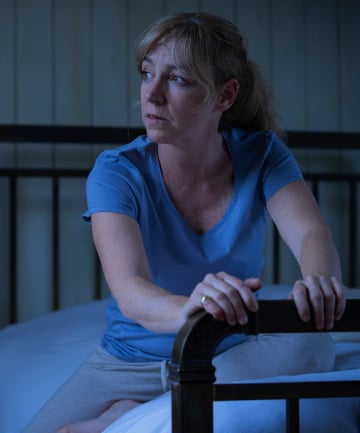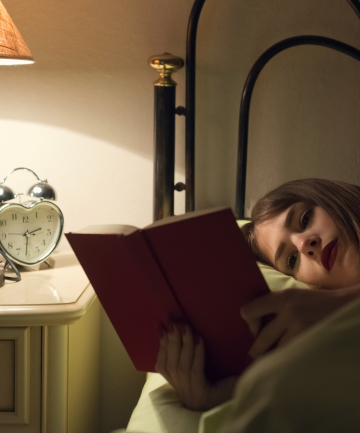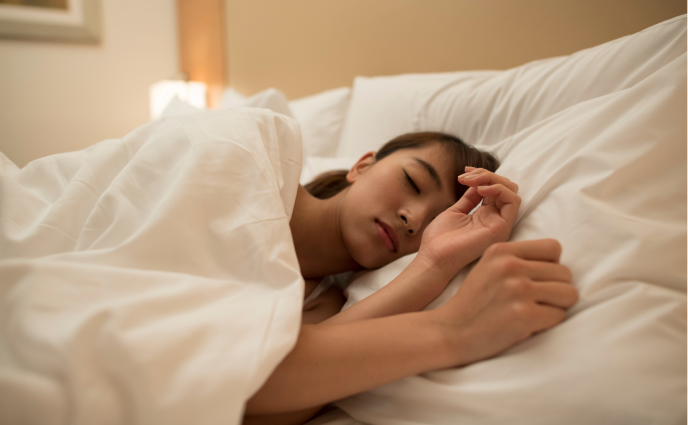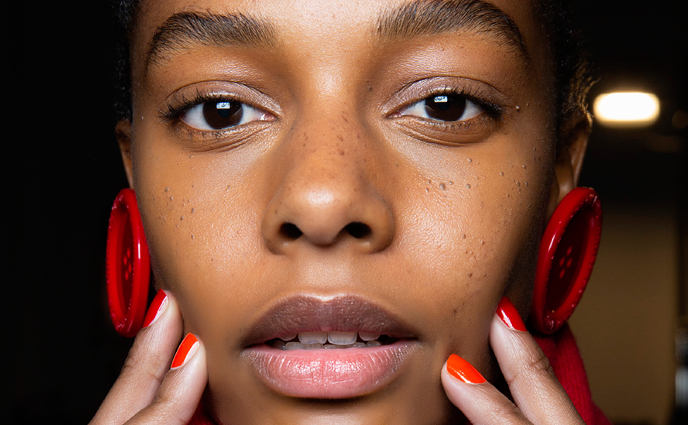From pillow sprays to bubble baths to essential oils, there are many products that promise to calm the mind and body. When wandering thoughts keep her awake, Hoyer uses the Bynacht Perfect Nacht Sleeping Balm, $90, to relax and slip into sleep more easily. "Bynacht, my overnight skin care brand, was literally born out of sleepless nights," says Hoyer. "I suffered from severe sleep deprivation and found aromatherapy to be the key for me."
Buy now
Buy now
A mindfulness practice can be beneficial to many aspects of life, including being a more welcoming way to move into sleep than watching TV or being glued to a screen. Newman says that it also provides an opportunity to reflect on the day and put it to rest as you begin your descent into slumber.
Had a particularly stressful day? Try a "brain dump," where you write out everything about the day that was difficult and/or aggravating, then place the paper away from your bedroom.
Image via Westend61/Getty
Had a particularly stressful day? Try a "brain dump," where you write out everything about the day that was difficult and/or aggravating, then place the paper away from your bedroom.
Image via Westend61/Getty
Phone addictions do not help. Rodriguez suggests avoiding too much screen time two to three hours before bed.
Similarly, she recommends avoiding the news before bedtime. Actually, avoiding the news at night can help anxiety as well as dreams. Newman suggests assessing your "media diet," including anything you're watching, listening and reading. "If you're consuming a lot of dark, macabre, troubling, violent or conflict-ridden content, it might penetrate your sleep hours in an unintended way," says Newman. "This is especially true if you have extenuating life circumstances and stresses that cannot be quelled." Offer your mind some respite with lighter content.
Image via Boy_Anupong/Getty
Similarly, she recommends avoiding the news before bedtime. Actually, avoiding the news at night can help anxiety as well as dreams. Newman suggests assessing your "media diet," including anything you're watching, listening and reading. "If you're consuming a lot of dark, macabre, troubling, violent or conflict-ridden content, it might penetrate your sleep hours in an unintended way," says Newman. "This is especially true if you have extenuating life circumstances and stresses that cannot be quelled." Offer your mind some respite with lighter content.
Image via Boy_Anupong/Getty
Rodriguez says that nightmares are related to anxiety so sometimes taking care of anxiety can help with bad dreams. Hoyer adds that other psychological triggers, such as depression, can cause nightmares, too.
"But the vast majority of nightmares are ironically caused by sleep deprivation," says Hoyer. "It's a doom loop: Sleep deprivation causes nightmares, causes sleep deprivation, causes nightmares, etc."
Image via PhotoAlto/Frederic Cirou/Getty
"But the vast majority of nightmares are ironically caused by sleep deprivation," says Hoyer. "It's a doom loop: Sleep deprivation causes nightmares, causes sleep deprivation, causes nightmares, etc."
Image via PhotoAlto/Frederic Cirou/Getty
You know how sometimes you randomly wake up at 3:30 a.m. and feel like you're never going to be able to fall asleep again? It might seem counterintuitive, but experts suggest getting out of bed if you haven't fallen back to sleep after about 15 minutes.
"If you spend too much time in bed tossing and turning your brain will be too activated," says Newman. "And you'll likely end up feeling stressed about not sleeping."
Dry reading material may also help — Rodriguez suggests reading something boring in dim light (though try to avoid reading on a screen). Alternatively, do another mellow activity until you feel fatigued again then try to go back to sleep, according to Newman. (Pro tip: This also works great if you're trying to fall back asleep after a nightmare.)
The process of getting relaxed and tired again can take a while but resist the temptation to switch on the TV or browse Instagram. "The blue light will ensure to keep you awake till dawn!" cautions Hoyer.
And, do not look at the clock. Repeat: Do not look at the clock.
Image via Francesco Carta fotografo/Getty
"If you spend too much time in bed tossing and turning your brain will be too activated," says Newman. "And you'll likely end up feeling stressed about not sleeping."
Dry reading material may also help — Rodriguez suggests reading something boring in dim light (though try to avoid reading on a screen). Alternatively, do another mellow activity until you feel fatigued again then try to go back to sleep, according to Newman. (Pro tip: This also works great if you're trying to fall back asleep after a nightmare.)
The process of getting relaxed and tired again can take a while but resist the temptation to switch on the TV or browse Instagram. "The blue light will ensure to keep you awake till dawn!" cautions Hoyer.
And, do not look at the clock. Repeat: Do not look at the clock.
Image via Francesco Carta fotografo/Getty



